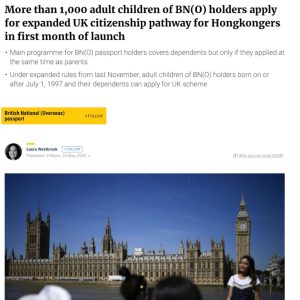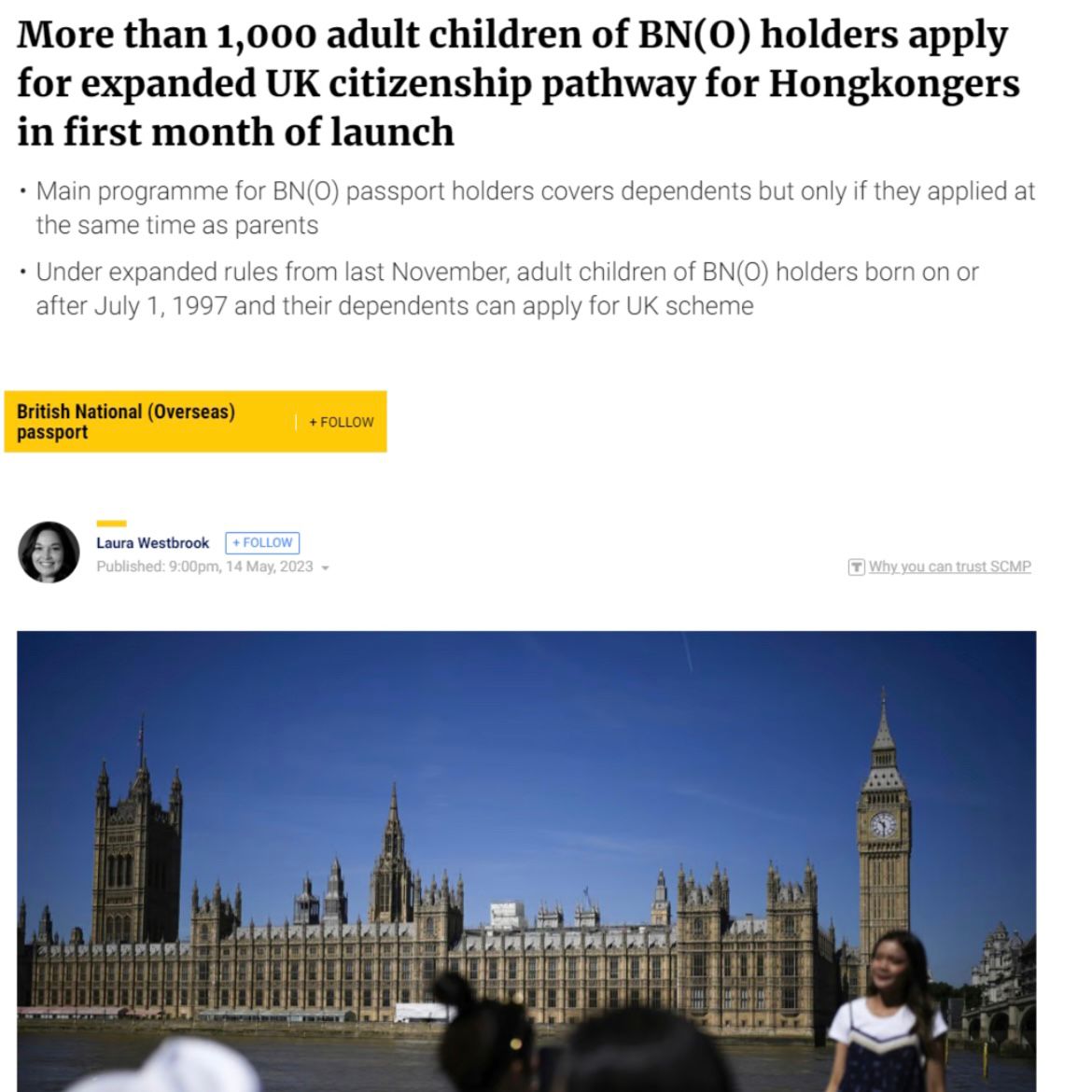【南華早報】More than 1,000 adult children of BN(O) holders apply for expanded UK citizenship pathway for Hongkongers in first month of launch

More than 1,000 adult children of BN(O) holders apply for expanded UK citizenship pathway for Hongkongers in first month of launch
More than 1,000 adult Hongkongers born on or after July 1, 1997, to parents holding British National (Overseas) passports applied for a pathway to UK citizenship in the first month under expanded rules covering such individuals, according to figures obtained by the Post.
The United Kingdom recorded 1,200 applicants under the extended scheme from November 30, 2022 till the end of December that year, the Post found from data retrieved from a Freedom of Information request, a right under British law allowing any individual to ask for details held by the public sector.
The initial BN(O) scheme was introduced in 2021 for relevant passport holders in response to Beijing’s imposition of the national security law on Hong Kong in 2020, which prohibits acts of secession, subversion, terrorism and collusion with foreign groups.
An estimated 5.4 million people out of Hong Kong’s 7.5 million population are eligible for the scheme, which allows successful applicants and their dependents to live, work and study in Britain for up to five years, after which they can apply for citizenship.
But only Hongkongers born earlier than June 30, 1997 – the day before the city’s handover from British to Chinese rule – were eligible for BN(O) status, making even the youngest recipients currently 25 years of age.
Adult children of a BN(O) status holder could apply for the UK scheme as dependents, but only if they did so at the same time as their parent. UK immigration minister Kevin Foster said last year this meant some were unable to access the citizenship scheme because their BN(O) parents did not apply.
From November 30, 2022, the UK government expanded the scheme to allow the adult children of BN(O) status holders born on or after July 1, 1997, to apply to the route independently from their parents, as well as their dependents, including partners and children aged under 18 years. Adults are classified as aged 18 or over.
Last August, the British Home Office said in its initial analysis that the expanded route could see a further 11,700 Hongkongers come to the UK over five years, of which between 4,600 and 5,600 would be in the first year of implementation.
In addition, figures from the UK Home Office also showed that between January 31, 2021 – when the main pathway opened for BN(O) status holders and their dependents – and December 2022, some 41,400 Hongkongers under 18 were approved for a visa out of 43,200 applications.
Hongkongers aged 35 to 44 made up the next-biggest group at 35,400 granted visas out of 37,100. The third-largest demographic comprised those aged 45 to 54, with 29,500 granted visas out of 31,100.
Hongkongers aged 25 to 54 made up 55 per cent – or 89,000 applications – of those eyeing the special visa.
As of December last year, about 95 per cent of applications – or 153,708 – were approved for the citizenship route since the scheme was launched.
At least 105,200 Hongkongers have arrived in the UK up until December, according to the British Home Office.
Hong Kong Chief Executive John Lee Ka-chiu has said the wave of emigration, including to Canada and Australia, which had also offered “lifeboat” settlement schemes to Hongkongers, had resulted in a brain drain. The city’s workforce has shrunk by about 140,000 over the past two years.
Among those who applied for the expanded route is 23-year-old Nicole Chan, whose father holds BN(O) status.
Chan said the city’s shrinking political freedoms, as well as an opportunity to live abroad and improve her English, were among the reasons she chose to apply for the expanded scheme.
Her boyfriend, 27, worked as a research scientist at Cambridge Science Park and Chan plans to live in Cambridge to study psychology at a university in London.
When Chan told her parents about her plan, they were confused and worried for her safety. “I told them I wanted to explore the world. I want to have a try, so don’t be afraid,” she said.
“I think [the scheme] is good because it can help this generation, the people who are born after 1997 to have an opportunity to go to the UK to explore more of the world.”
Another Hongkonger considering the scheme was Mary*, 23, who graduated with a journalism degree. However, she was concerned she did not have enough work experience to land a job there, and decided to complete a master’s degree in art management before making the move overseas.
“My major concern is definitely the cost of living, but I think it would be bearable if I avoided major cities like London. I do not particularly want to live in London, though I am aware that there are more job opportunities there,” she said.
Margaret Szeto, founder of migration consultation company Aura Global, said the expanded visa was appealing for “ambitious and adventurous” young Hongkongers, but cautioned “whether they will eventually settle in the UK remains to be seen”.
Adapting to a new environment could be among challenges migrants would face, especially if they had grown up with significant parental support in Hong Kong, Szeto pointed out.
“Additionally, adjusting to British culture may also pose a challenge. Furthermore, the job market may present different challenges for young people, depending on their level of education and English language proficiency. Those with higher education and language skills will have greater access to a broader range of job opportunities.”
*Name changed at interviewee’s request



